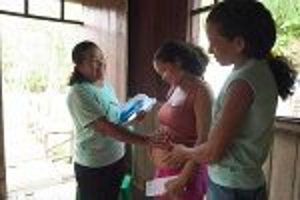
Foto: Eli Pio
Everyone has the right to live with dignity. This right begins at the conception of a new life. Therefore, the Child’s Pastoral begins its ctivities with the pregnant woman that needs to be assisted since the beginning of pregnancy.
Visiting the community families is the main way to find the pregnant women. Some women soon tell the leader that they are pregnant. Others take a little more time and the leader will only get to know about their pregnancy at a following visit.
Some signals can help the woman to find out if she is pregnant:
• No menstruation;
• Sore and increased breasts;
• Mood swings: in one moment she is happy in another she is sad;
• Nauseas and frequent dizziness.
“Mary set out at that time and went as quickly as she could into the hill country to a town in Judah. She went into Zechariah's house and greeted Elizabeth. Now it happened that as soon as Elizabeth heard Mary's greeting, the child leapt in her womb and Elizabeth was filled with the Holy Spirit.” Luk 1: 39-41
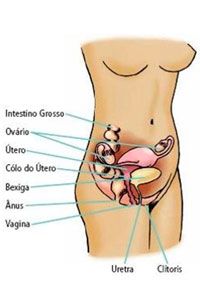
Getting to know a little about the human body
The external male genitalia are called pennies and testicles. The female organ is called vulva. In both man and woman they extend inside the body where it is not possible to see them. The testicles and the ovaries produce the reproductive cells that allow for the conception of the babies.
The male reproductive cell is called spermatozoon; the female reproductive cell is the ovule.
The man’s spermatozoon leaves by the same canal as the urine. The woman’s genitalia are separated from the urinary system organs.
When the girl releases the first ovule we say that she is no longer a child. Now she is able to conceive. The first ovulation usually occurs between 10 and 14 years old.
The woman’s uterus gets ready for the pregnancy each month. In case she does not conceive, her body removes the “net” prepared by the womb which leaves in the form of menstruation. This occurs 14 days after the ovulation.
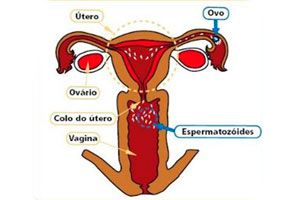
Fecundation
The spermatozoon has to join an ovule in order to conceive a baby. The union of these two cells forms an egg, in other words, the first cell of the baby. At this moment a new being is born.
The ovule is impregnated two weeks before the expected date of the menstruation. Three weeks after conception, the baby’s heart is already beating inside the mother’s uterus. In this period, many women do not yet suspect that they are pregnant because the menstruation delayed one week only.
The baby grows day after day during 40 weeks, the time that pregnancy usually takes. During pregnancy the woman needs to be more careful with her health and nutrition.
Talking to the pregnant woman and her family

Foto:
Pregnancy is a time of many changes for the woman. She may be more sensitive because she is going through changes in her body and mood. Therefore, she should be treated with affection and tenderness.
When the partner and the other members of the family understand how the pregnant woman feels during this period they can better help in whatever necessary so that she has a healthy and happy pregnancy.
The first leader’s mission is to lend an ear to the pregnant woman and her partner, listening to what they have to say about pregnancy. Many couples become happy when they find out about the pregnancy for they were already preparing themselves for having a baby. Other couples, however, can feel frightened, anxious and concerned because they had not planned the woman to become pregnant at that moment of their lives. Others still become concerned with the difficulties they might face or fear not being able to take care of the baby.
Leader, all the pregnant women need your assistance, even if they already have other children because one pregnancy is different from the other.
Some women, when they conceive for the first time, may feel embarrassed or think that the prenatal check is not important because they feel well. Pregnant women that already have children may think that it is not necessary to do the prenatal check again.
It is common that the adolescent pregnants try to hide their pregnancy fearing the reaction of their partners, parents, relatives and friends. At the home visit, the leader should advise the family about the importance of their support and understanding so that the adolescent can live this moment with serenity, responsibility and love.
The well being of the pregnant adolescent is very important so that she can feel secure and confident for the good development of the pregnancy and for the baby’s health. And, therefore, she will need the support from everybody to worth the life she carries inside her belly and to feel responsible for it.
Leader, some pregnant women who do not have a partner, may need more help from you because they may miss someone to share their joys and difficulties.
Researches indicate that in order to reduce the infant mortality rate - the number of deaths of children younger than one year old - more attention and support shall be given to the following pregnant women:
- The poor ones;
- The coloured ones;
- The ones who have no partner;
- The ones with low education;
- The ones with two or more children;
- The ones under 20 years old;
- The ones with high blood pressure or diabetes;
- The ones that lost a baby in a previous pregnancy or a child who was younger than one year old;
- The ones who smoke.
Love Bonds

Foto: Eli Pio
Love bonds are a set of cards made for the pregnant woman. They are designed to increase the involvement of the pregnant woman and her family with the pregnancy, and to show her needs, her baby’s needs and to encourage her to do the prenatal check.
These cards have to be delivered to the pregnant women at the home visits every month. They are a great help for the leaders to give practical advices to the pregnant woman on how she can take better care of herself and on how to create a stronger bond with the coming baby.
Before delivering each one of the card, it is important to read the cards together with the pregnant woman and her family. This helps all the family to accept the child with love and commitment even if they have to face difficulties.
When the pregnant receives support and understanding from the partner and the family she remains calm and she can transmit this calmness to the baby.
“Whatever house you enter, let your first words be, "Peace to this house!” Luk 10:5
Leader, learn how to use the Love Bonds cards:
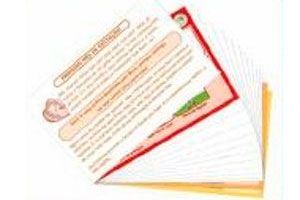
Foto:
- When visiting the pregnant woman for the first time, deliver the card regarding the pregnancy month in which she is and the card with the signs of pregnancy danger;
- Read each card that you deliver together with the pregnant woman and, if possible, with the baby’s father;
- Deliver also the set of cards cover so that she can keep the cards;
- Keep the envelope and the remaining cards with you;
- Every month deliver a new card to the pregnant woman.
- Leader, inside the envelope where the cards are kept you will find more instructions about the delivery of this material to the pregnant woman.
If the pregnant woman moves to another community, deliver all the Love Bonds cards to her so that she can continue taking care of herself and having a souvenir of you and of the Child’s Pastoral.
“I bless the Lord who is my counselor, even at night my heart exhorts me.” Psa 16:7
Task suggestion for this qualification stage:
Visit a pregnant woman you have already met, deliver and read the card of Love Bonds regarding her pregnancy month with her.
Home Visit
To Assess and celebrate
- How did the pregnant woman you had already met receive your visit?
- Was there any explanation about the Love Bonds that you did not understand or that was not accepted by the pregnant woman?
- Now that you know a little more about the Child’s Pastoral, would you like to be and can you be a Pastoral leader?
- Let us choose and share a message, a pray or a biblical quotation which celebrates the gift of life and the actions that we have performed with our next, the pregnant women and their families? A suggestion is:
“You formed my inmost being; you knit me in my mother's womb. I praise you, so wonderfully you made me; wonderful are your works! My very self you knew; Your eyes foresaw my actions; in your book all are written down; my days were shaped, before one came to be.” Psa 139: 13-14.16
To See
The pregnant woman
1. How do the women that you know react when they find themselves pregnant?
2. How do the pregnant women you know use to feed themselves?
Leader, the home visit is the moment when you feel closer to the families followed and you may:
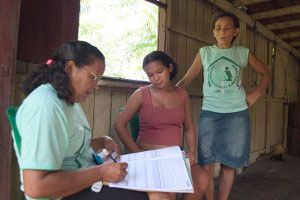
Foto:
- Show appreciation for the good things the families do to take care of their children;
- Talk about pregnancy;
- Talk about the care and education of the children;
- Alert about the signs of danger to the pregnant woman and the baby’s health;
- Identify unfavourable situations for the child’s development;
- Grasp the possible problems and difficulties faced;
- Look for ways to solve these problems together.
In each new visit you and the family become closer. The family begins to feel safer to talk about their happiness and difficulties, because they feel that you are discrete and do not comment their own private problems with the other families.
At the first visit to a family and the pregnant woman you should introduce yourself, explain what the Child’s Pastoral work is and ask if they accept to be followed up. At the following visits, the family gets to know better about your work and you also begin to grasp what the family does to take care of the pregnant woman and of the child.
At the visits it is necessary first to listen to what the family members have to say and try to help them based on their needs, always respecting what they think and believe. Thus, you, leader, become a partner that walks besides them and that is always nearby to support and instruct them.
With the support of this guide, you can reinforce family and pregnant woman cares and attitudes, which help to build a favourable environment for the child development and of a good pregnancy.
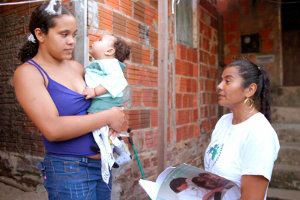
Foto:
To help to assist the family with the cares of the pregnant woman and the children, sometimes just a simple advice is enough. In other situations it may be necessary that apart from that you will have to ask for help from other people of the Child’s Pastoral, of the Church or of the public services such as: health, education and social assistance services.
When you do not know how to answer a question, do not worry because nobody knows everything. Say that you will look for the answer and bring it to them on the next meeting.
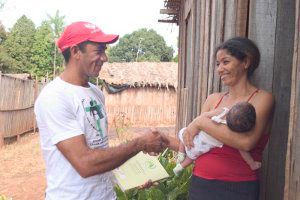
Foto:
It is necessary to talk carefully about the more delicate situations in order not to hurt the family or the child. The 10 Commandments for the Peace in the Family, a tool that will be studied later on, can also help in these conversations.
It is good to agree on the best hour for the visits with the family in order not to disturb the housekeeping activities. During the visits, invite the families to participate on the Life Celebrating Day, when the children are weighed. Remember to inform the date, the hour and the place of the celebration and show how important is the presence of the child and the parents on that occasion.
Leader, each time you perform your visit take this guide, the Leaders’ Notebook and other working tools of the Child’s Pastoral with you.
“For the help provided by this contribution not only satisfies the needs of God's holy people, but also overflows into widespread thanksgiving to God” 2Co 9:12
Healthy Food
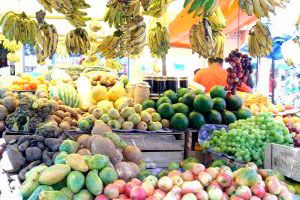
Foto:
The woman needs good food in order to keep herself healthy and for her baby to grow and be born with adequate weight. If the pregnant nourishes herself badly, she may become anemic and undernourished. Her baby may be born with low weight, be more susceptible to diseases and take more time to recover from them.
Healthy food contains varied food, clean, fresh and in sufficient quantity. It is very important to be concerned about the food quality and quantity. Both the food lack and the food excess may harm health.
For healthier food it is necessary to give preference to fresh food and avoid industrialized food, mainly soft drinks and salty snacks. The way to prepare the food is also very important: it is always better to eat roast and boiled food rather than fried food.
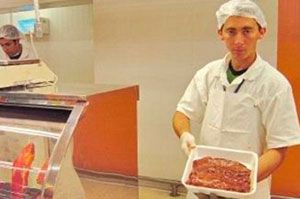
Foto:
Iron is an important nutrient for a healthy pregnancy and for the good development of the baby in the mother’s belly.
The lack of iron may cause anemia, a disease very common in childhood, pregnancy and adolescence, phases in which the necessity of this nutrient is high, because the changes in the body are more intense. Therefore, the pregnant woman should eat food rich in iron, such as:
• Meat, poultry and fish;
• Giblets as heart, liver, kidneys, spleen;
• Grains: beans, lentil and pea;
• Dark green leaves vegetables: arum, cabbage, watercress, parsley, green onion;
• Molasses, Brazil nut, cashew nut and peanut.
Iron is best consumed when the pregnant woman eats food rich in C and A vitamins at the same meal.
Vitamin C helps to prevent infections, muscle weakness, gum bleeding and heals scars from injuries. Some food rich in C vitamin are, for example:
Crude fruit: lemon, orange, pineapple, cashew, papaya, acerola, “murici”; Crude greens: dark green leaves, pepper.
Vitamin A helps to prevent diarrhea, infections, protects the vision and helps the baby to grow in the womb and also strengthens the body defences. Some food rich in A vitamin are:
• Orange and red vegetables: pumpkin, carrot;
• Dark green leaves;
• Milk, butter, cheeses;
• Egg yolk;
• Yellow fruit: mango, kaki, papaya, “pequi”;
• Fruit of palm trees: “buriti”, cabbage, “tucumã”, palm oil.



Iodine is important for the physical and mental development. The lack of iodine in the pregnant’s body has an affect on the baby’s brain formation. Food having iodine:
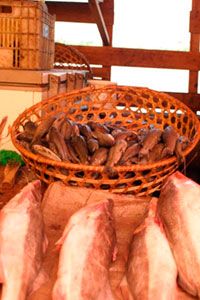
Foto:
• iodine salt;
• Fish and shellfishes;
• Greens, vegetables and fruit planted in soil rich in iodine, that means, soils next to the sea
Calcium is important for the pregnant woman and for the baby because it helps forming and preserving strong teeth and bones. Some food rich in calcium are:
• Milk, cheese, curd and yoghurt;
• Dark green leaves;
• Sesame;
• Small fishes.
Leader, orient the pregnant to prepare a maximum of food for two meals each time. Thus she will not consume old food and will reduce the chance for spoiled food. Orient her to avoid fried food and to value roast and boiled food.
• Folic acid as in viscera, beans and dark green leaves vegetables, help to prevent problems in the baby’s brain and spine.
• Leader, you can help the pregnant and the family to better consume the food and to improve her nutritional condition advising that:
• A dish with varied food of different colours has more vitamins and minerals;
• The seasonal and regional food are fresh, more tasty and nutritious and cheaper;
• Each meal should have at least one crude food which can be a salad or a fruit;
• It is better to eat the food right after preparation. Reheated food or boiled for a long time may cause nutrient loss;
• The leftovers of cooked food should be kept in the refrigerator or in a fresh place covered by sieves or cloths;
• The vessel where the water is kept should be covered;
• Coffee, Paraguay tea, black tea, milk and derivatives, chocolate and soft drinks may prevent the iron absorption and should be avoided up to two hours after the meals.



Everyone has the right to eat quality food and in the necessary amount to have health. This is safe feeding and nutrition.
Breastfeeding
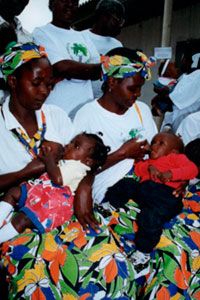
Foto:
Breastfeeding is very important for the mother and the baby’s health. Let’s see why?
The human milk is complete for the baby. It is the only food that the baby needs up to six months of age. Therefore it is good to talk to the pregnant woman, the partner and the whole family about the importance of breastfeeding. When the partner and other family members encourage breastfeeding the mother relaxes and feeds her baby for a longer time.
The conversations about breastfeeding can be based on what the pregnant woman and the partner want to know. This helps the leader’s orientations to be heard and put into practice.
A good start is to talk about the experiences of breastfeeding which the pregnant knows. What the sisters, grandmothers, mother-in-law, mother, friends and the partner say about breastfeeding can influence the pregnant woman on her wish to feed.
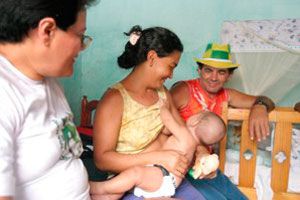
Foto:
Leader, encourage the mother to breastfeed, talk about the advantages of breastfeeding to the baby:
• The human milk protects the baby against diseases as allergies, diarrhea, flues, urinary and respiratory infections;
• It is of easy digestion;
• Sucking develops and strengthens the baby’s mouth muscles, improving the chew, the act of swallowing and of speaking;
• It is a very special moment which strengthens the relationship between mother and child and conveys security, affection and the love necessary to develop well;
• It is a complete food.
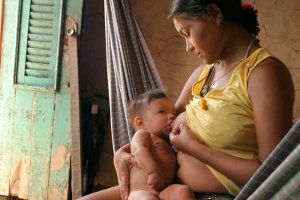
Foto:
Advantages of breastfeeding to the mother:
• It helps to diminish the bleeding after childbirth making the womb and the breasts volume return faster to their normal size;
• It increases the affective bond with the baby;
• In the first months, the breastfeeding prevents the ovulation, acting as a natural contraceptive. But, for the mother not to become pregnant again it is necessary that the baby is only breastfed when he/she wants without drinking tea or water;
• It is economic and comes ready;
• It reduces the risk of breast and ovarian cancer.
Breastfeeding: It is good for the mother and better for the baby!
“A man never hates his own body, but he feeds it and looks after it; and that is the way Christ treats the Church….” Eph 5:29
Hygiene

Foto:
Pregnancy is a very special moment. It is important that the woman continues to take care of herself and to feel pretty in this phase of her life.
Leader, some tips help to guide the pregnant women:
• The bath in current water is better: it may be of a spring, shower or with the help of a big mug;
• The bath with the woman sitting in a basin or with showers in the vagina are not recommended because they transport the pathogenic bacteria/microbes from the vagina to the womb where the baby is;
• Having her to wash her hair does no harm to the pregnant woman nor to the baby;
• Clean and comfortable clothes provide a well being feeling;
• Socks with tight bands may prevent the blood from circulating and may cause varicose veins;
• The best shoes are those with non-sliding soles to avoid falls.
Mouth health
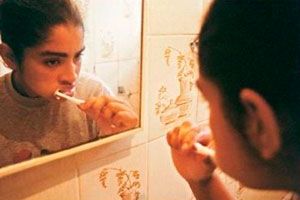
Foto:
During pregnancy, tooth decay may appear if the consumption of food with sugar increases and the teeth are little brushed. The pregnant woman should do the daily mouth hygiene with dental floss, toothbrush and toothpaste calmly and carefully. In doing so the mouth is kept healthy.
Leader, guide the pregnant woman to clean her teeth as follows:
First use the dental floss, even if the gum bleeds;
Brush the superior teeth from upside to downside and the inferior teeth from downside to upside;
Brush the teeth in their inner and outer part close to the cheek;
Do the shuttle movement in the flat part of the back teeth;
Brush the tongue.
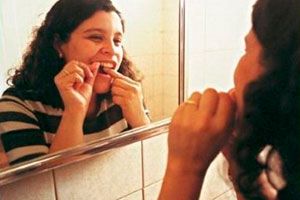
Foto:
The dental floss should be passed carefully between the teeth and the gum in order to remove the food leftovers that are not removed with the brushing.
Leader, you can teach the pregnant woman and the family to prepare a cottar dental floss using a piece of line from a bobbin number ten passed in paraffin or bee’s wax. Another material that can be used is the transparent raffia of packages, since it is very clean. Even a strip of a plastic bag or of a milk pack can be used as dental floss.
Dangerous substances during pregnancy
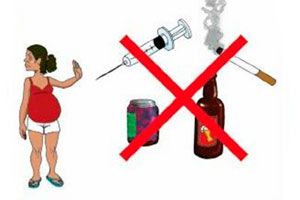
Foto:
It is important that the leader teaches about the consequences of the drug consumption during pregnancy.
The drugs, besides preventing the baby’s growth can create dependence since the birth.
Cigarettes cause the babies to be born with low weight, premature childbirth and increase the chances of the baby to be born with problems.
When the pregnant woman consumes alcohol, besides the risk of abortion, she may have a baby with “Foetal Alcohol Syndrome”. In this syndrome the baby may have problems of growth and in the nervous system.
Some medications also prevent the baby body’s formation. Thus during pregnancy, only medications with the knowledge of the doctor who follows the prenatal check shall be used.
Urinary infection
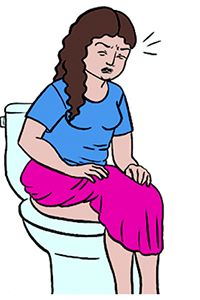
Foto:
Along with the growth of the baby, the womb begins to push the bladder down and that is why the pregnant woman needs to urinate every hour.
As the womb grows it starts to occupy more room and can also push the urine canal. This creates conditions for the urine to remain there and to cause urinary infection. It is important that the pregnant woman goes to the bathroom whenever she needs and empties the bladder well.
If the pregnant complains of belly pain or ardency to urinate, this can be a signal of infection. In this case, she should be taken to the health service, even if that date is not the appointment date she already had made to talk to the doctor. The urine exam is included in the prenatal check.
Attention: The urinary infection is frequent and easy to be solved during pregnancy. If it is not treated in time it can cause abortion, kidney infection and childbirth before the time (premature).
Anemia
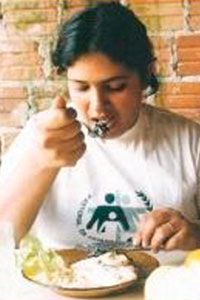
Foto:
Anemia by lack of iron in the body causes the decrease in the capacity of the body taking oxygen from the air we breathe. Therefore, the main symptoms are tiredness, lack of wish to do things and low appetite.
Anemia is caused by nutrition low in iron. The pregnant woman needs to eat food rich in iron because she is generating a child. See the food rich in iron on page 30 (Healthy Food).
Children of pregnants with anemia have a greater chance to be born with low weight and to die within the first days of life.
A pregnant woman with pale skin, weakness, discouraged and with difficulty to win weight may have anemia. It is important that she tells the doctor what she is feeling.
The Health Ministry recommends that: every pregnant woman shall receive iron since the 5th pregnancy month until the 3rd month after the birth even though she is not anemic.
Obesity
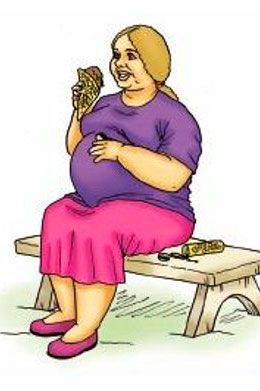
Foto:
Obesity is the weight much over the ideal weight, with excess of fat in the body. It is caused, in the majority of the cases, by the ingestion of much unhealthy food and as a result of not exercising the body. Obesity is a disease, which may cause other diseases such as diabetes, high blood pressure, heart attack and stroke.
In the pregnant woman the excessive weight increases the risk for high blood pressure (hypertension), pre-eclampsia and bleeding after the labour. These diseases will be mentioned later.
Leader, during your visits, talk about the benefits of a healthy nutrition. Good nutrition habits bring health to the mother and to the baby.
• Healthy food available in the community:
• Price of meat, fish, shellfish, liver and other viscera:
• Places where fresh and cheaper food can be found:
• Suggestions on how to facilitate the families’ access to shops or markets where these fresh and cheaper food are bought: _
• Recipes and cooking ways as well as the food matching to better use the sources of iron, vitamins and other nutrients in the pregnant nutrition:_
Task suggestion for this qualification stage:
Fill in the activity items about food on this page.



